【核心素养目标】Unit 3 I'm more outgoing than my sister Section A 1a-2d 导学案(含答案)
文档属性
| 名称 | 【核心素养目标】Unit 3 I'm more outgoing than my sister Section A 1a-2d 导学案(含答案) | 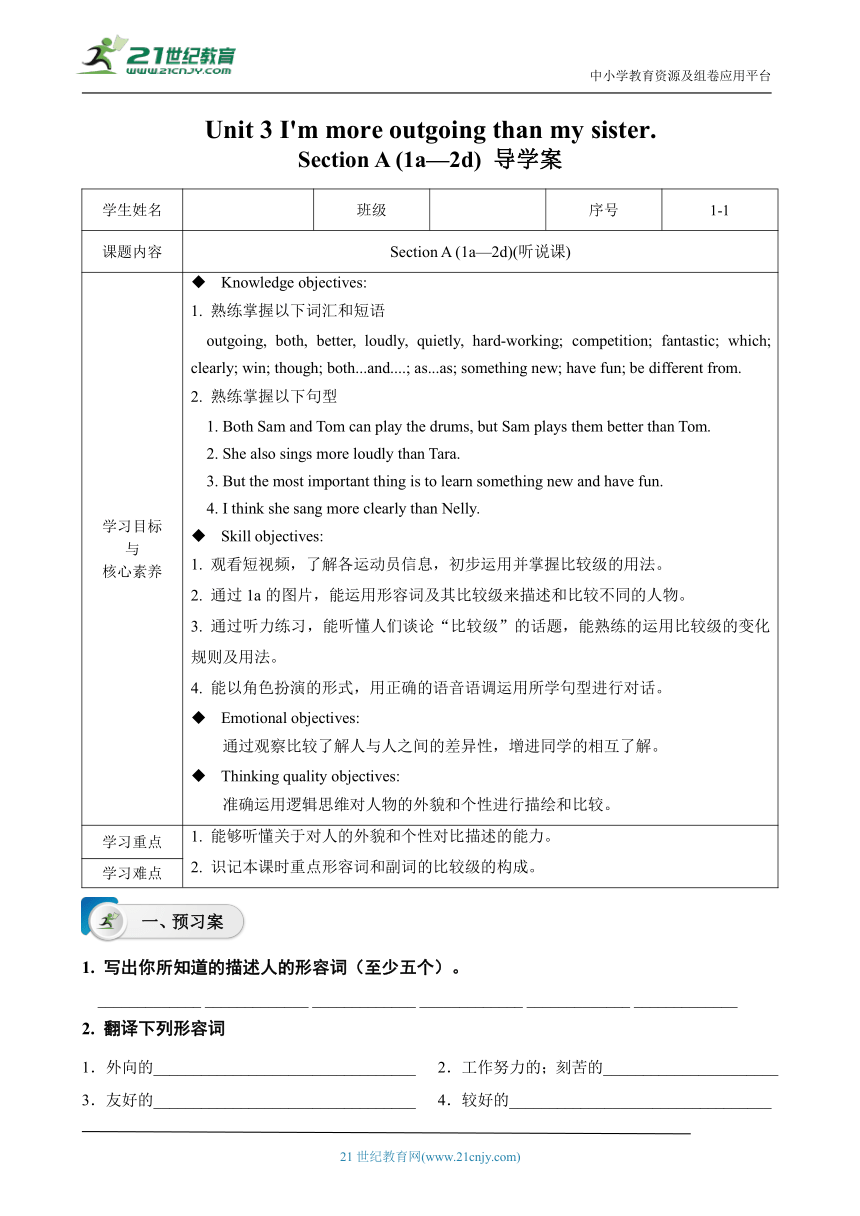 | |
| 格式 | docx | ||
| 文件大小 | 1.4MB | ||
| 资源类型 | 试卷 | ||
| 版本资源 | 人教新目标(Go for it)版 | ||
| 科目 | 英语 | ||
| 更新时间 | 2022-09-05 14:31:57 | ||
图片预览

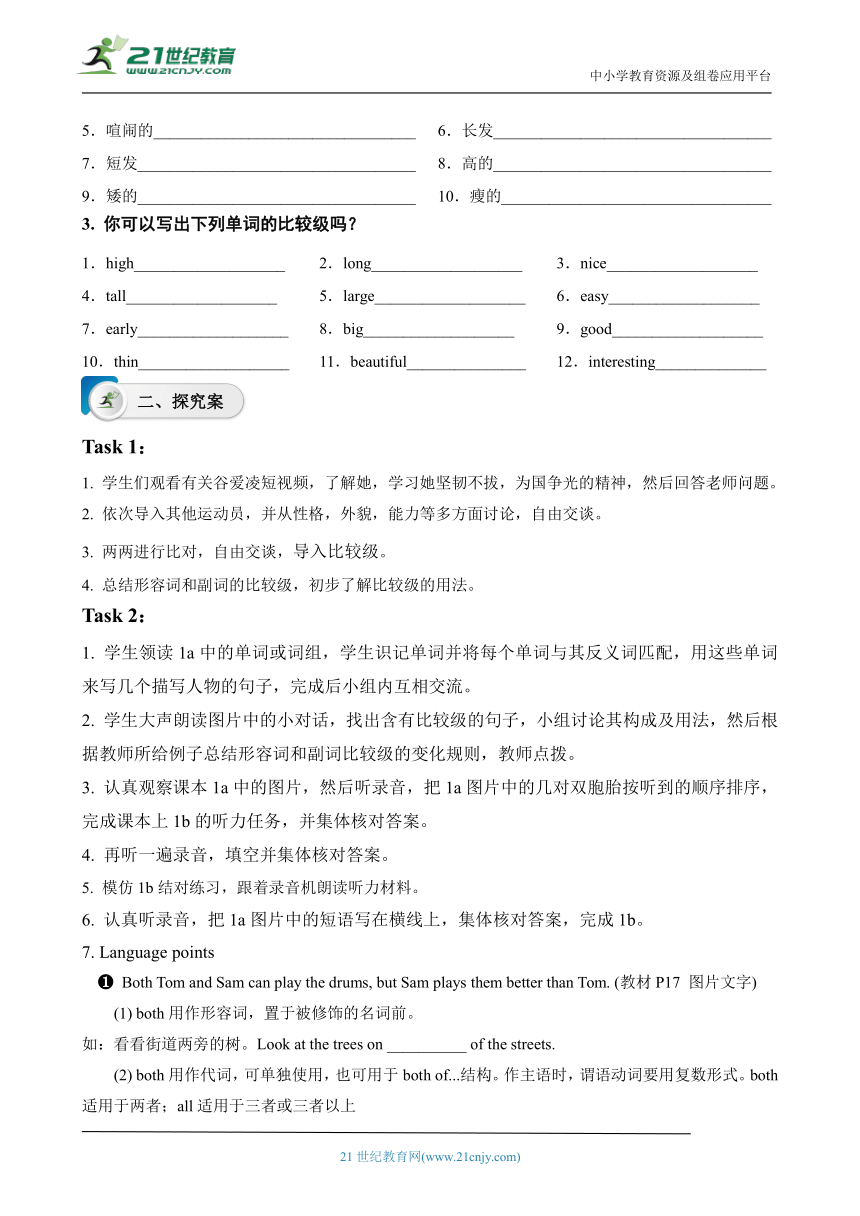
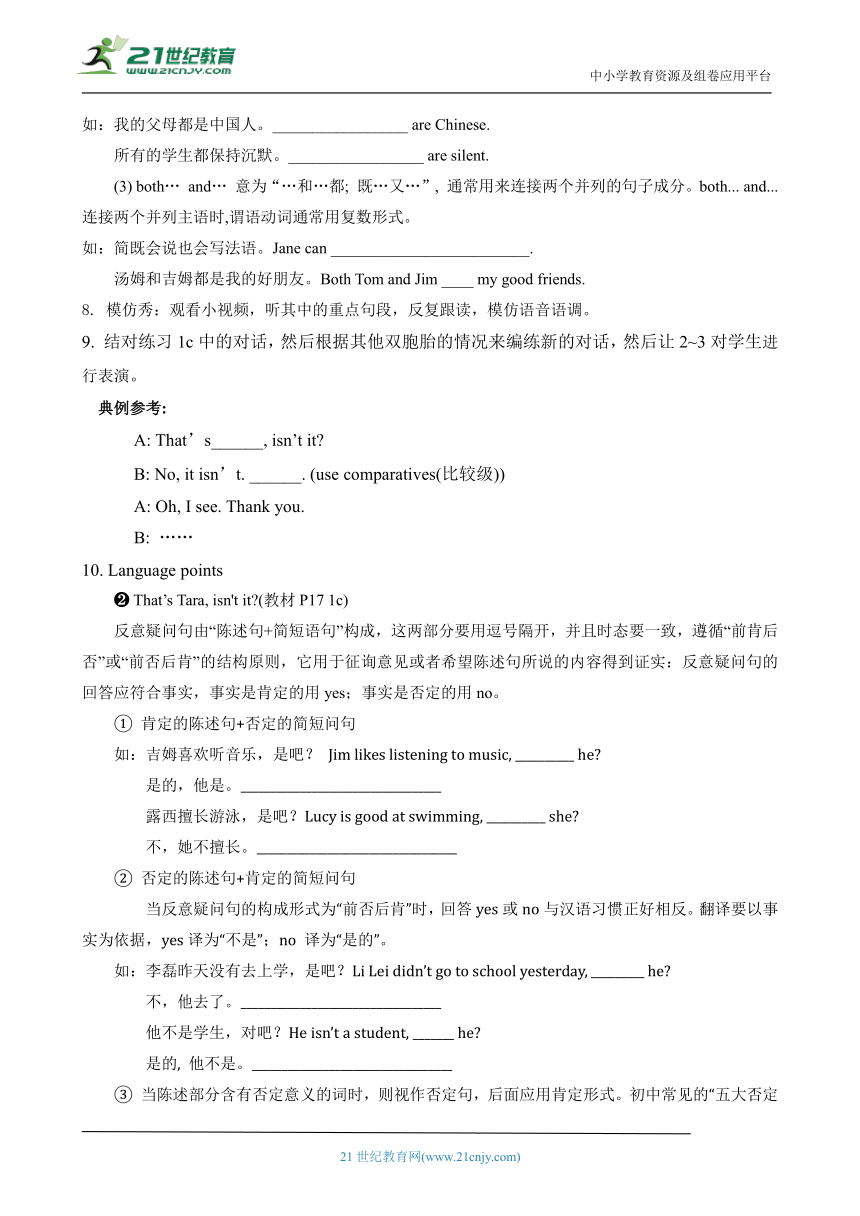
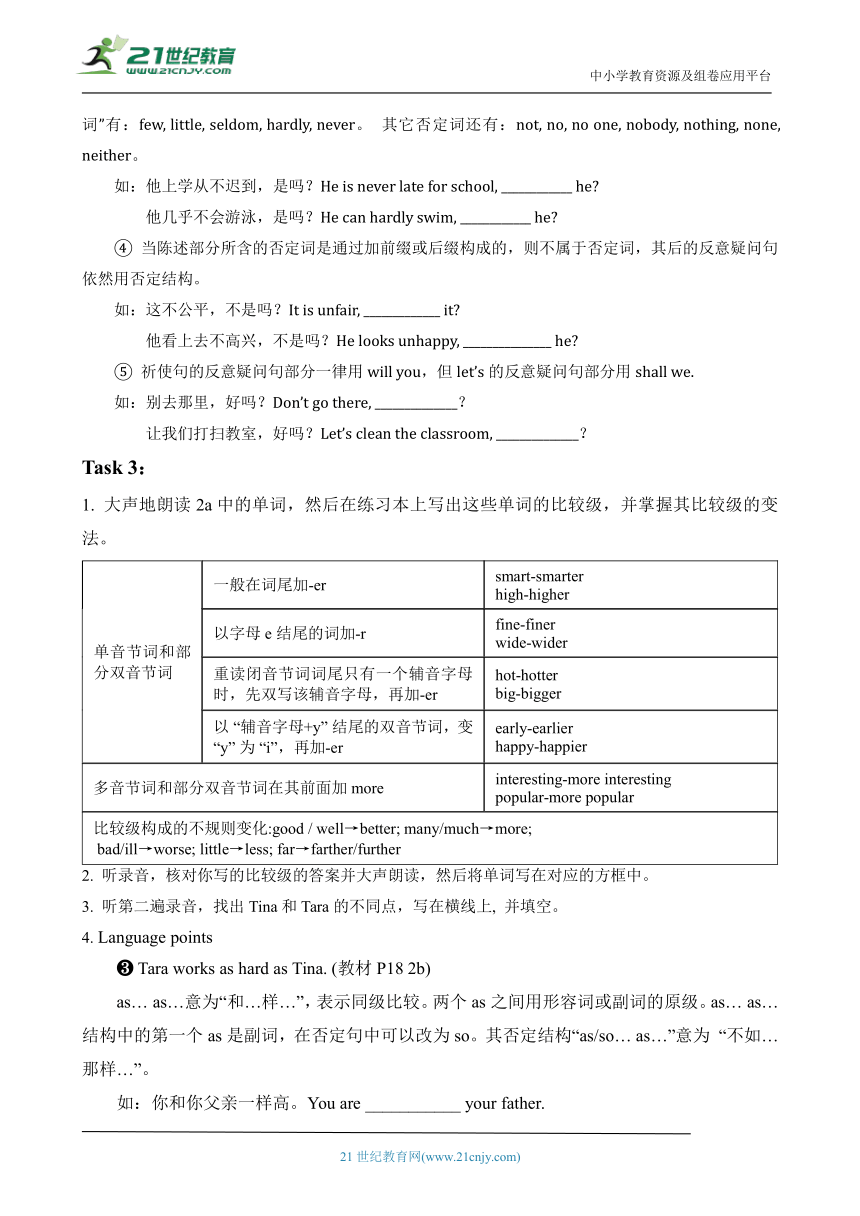
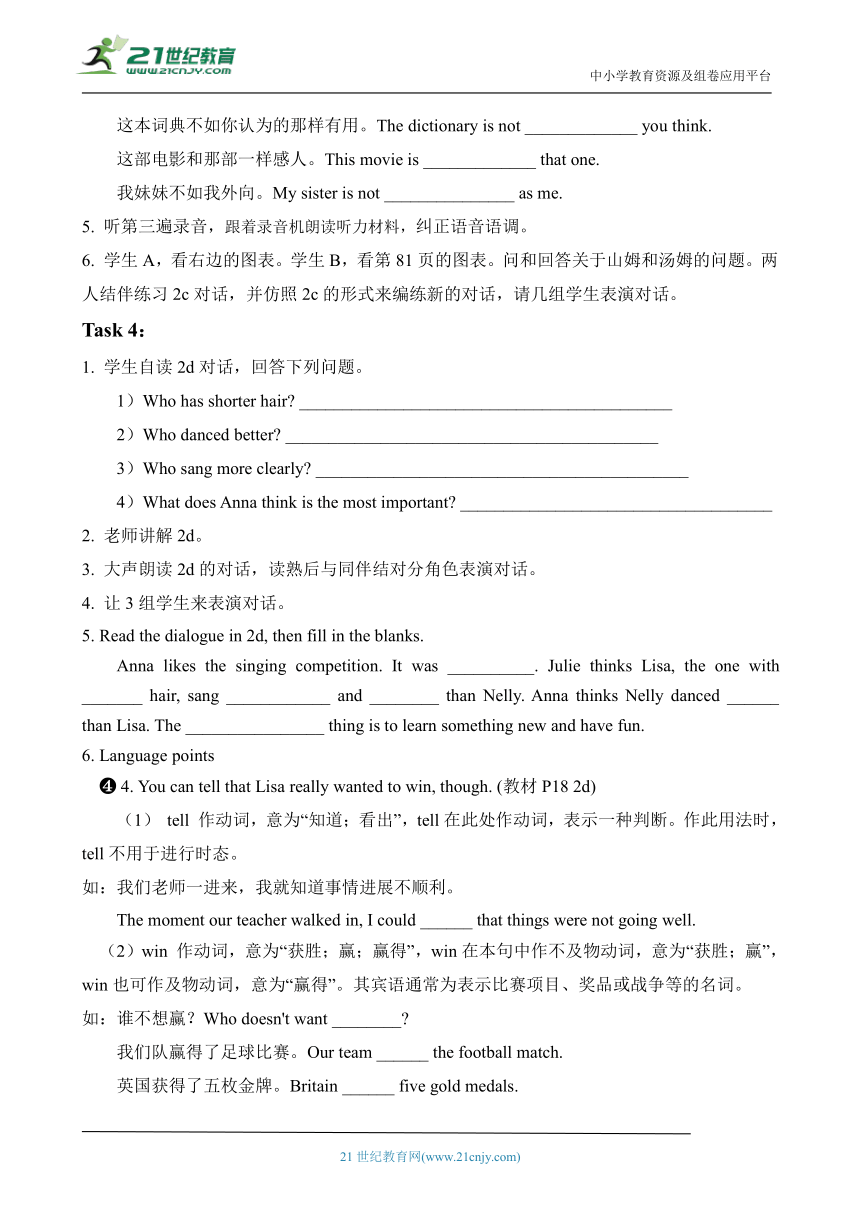
文档简介
中小学教育资源及组卷应用平台
Unit 3 I'm more outgoing than my sister.
Section A (1a—2d) 导学案
学生姓名 班级 序号 1-1
课题内容 Section A (1a—2d)(听说课)
学习目标 与 核心素养 Knowledge objectives: 1. 熟练掌握以下词汇和短语 outgoing, both, better, loudly, quietly, hard-working; competition; fantastic; which; clearly; win; though; both...and....; as...as; something new; have fun; be different from. 2. 熟练掌握以下句型 1. Both Sam and Tom can play the drums, but Sam plays them better than Tom. 2. She also sings more loudly than Tara. 3. But the most important thing is to learn something new and have fun. 4. I think she sang more clearly than Nelly. Skill objectives: 1. 观看短视频,了解各运动员信息,初步运用并掌握比较级的用法。 2. 通过1a的图片,能运用形容词及其比较级来描述和比较不同的人物。 3. 通过听力练习,能听懂人们谈论“比较级”的话题,能熟练的运用比较级的变化规则及用法。 4. 能以角色扮演的形式,用正确的语音语调运用所学句型进行对话。 Emotional objectives: 通过观察比较了解人与人之间的差异性,增进同学的相互了解。 Thinking quality objectives: 准确运用逻辑思维对人物的外貌和个性进行描绘和比较。
学习重点 1. 能够听懂关于对人的外貌和个性对比描述的能力。 2. 识记本课时重点形容词和副词的比较级的构成。
学习难点
1. 写出你所知道的描述人的形容词(至少五个)。
_____________ _____________ _____________ _____________ _____________ _____________
2. 翻译下列形容词
外向的_________________________________ 工作努力的;刻苦的______________________
友好的_________________________________ 较好的_________________________________
喧闹的_________________________________ 长发___________________________________
短发___________________________________ 高的___________________________________
矮的___________________________________ 瘦的__________________________________
3. 你可以写出下列单词的比较级吗?
high___________________ long___________________ nice___________________
tall___________________ large___________________ easy___________________
early___________________ big___________________ good___________________
thin___________________ beautiful_______________ interesting______________
Task 1:
1. 学生们观看有关谷爱凌短视频,了解她,学习她坚韧不拔,为国争光的精神,然后回答老师问题。
2. 依次导入其他运动员,并从性格,外貌,能力等多方面讨论,自由交谈。
3. 两两进行比对,自由交谈,导入比较级。
4. 总结形容词和副词的比较级,初步了解比较级的用法。
Task 2:
1. 学生领读1a中的单词或词组,学生识记单词并将每个单词与其反义词匹配,用这些单词来写几个描写人物的句子,完成后小组内互相交流。
2. 学生大声朗读图片中的小对话,找出含有比较级的句子,小组讨论其构成及用法,然后根据教师所给例子总结形容词和副词比较级的变化规则,教师点拨。
3. 认真观察课本1a中的图片,然后听录音,把1a图片中的几对双胞胎按听到的顺序排序,完成课本上1b的听力任务,并集体核对答案。
4. 再听一遍录音,填空并集体核对答案。
5. 模仿1b结对练习,跟着录音机朗读听力材料。
6. 认真听录音,把1a图片中的短语写在横线上,集体核对答案,完成1b。
7. Language points
Both Tom and Sam can play the drums, but Sam plays them better than Tom. (教材P17 图片文字)
(1) both用作形容词,置于被修饰的名词前。
如:看看街道两旁的树。Look at the trees on __________ of the streets.
(2) both用作代词,可单独使用,也可用于both of...结构。作主语时,谓语动词要用复数形式。both适用于两者;all适用于三者或三者以上
如:我的父母都是中国人。_________________ are Chinese.
所有的学生都保持沉默。_________________ are silent.
(3) both… and… 意为“…和…都; 既…又…”, 通常用来连接两个并列的句子成分。both... and...连接两个并列主语时,谓语动词通常用复数形式。
如:简既会说也会写法语。Jane can _________________________.
汤姆和吉姆都是我的好朋友。Both Tom and Jim ____ my good friends.
8. 模仿秀:观看小视频,听其中的重点句段,反复跟读,模仿语音语调。
9. 结对练习1c中的对话,然后根据其他双胞胎的情况来编练新的对话,然后让2~3对学生进行表演。
典例参考:
A: That’s______, isn’t it
B: No, it isn’t. ______. (use comparatives(比较级))
A: Oh, I see. Thank you.
B: ……
10. Language points
That’s Tara, isn't it (教材P17 1c)
反意疑问句由“陈述句+简短语句”构成,这两部分要用逗号隔开,并且时态要一致,遵循“前肯后否”或“前否后肯”的结构原则,它用于征询意见或者希望陈述句所说的内容得到证实:反意疑问句的回答应符合事实,事实是肯定的用yes;事实是否定的用no。
① 肯定的陈述句+否定的简短问句
如:吉姆喜欢听音乐,是吧? Jim likes listening to music, __________ he
是的,他是。__________________________________
露西擅长游泳,是吧?Lucy is good at swimming, __________ she
不,她不擅长。__________________________________
② 否定的陈述句+肯定的简短问句
当反意疑问句的构成形式为“前否后肯”时,回答yes或no与汉语习惯正好相反。翻译要以事实为依据,yes译为“不是”;no 译为“是的”。
如:李磊昨天没有去上学,是吧?Li Lei didn’t go to school yesterday, _________ he
不,他去了。__________________________________
他不是学生,对吧?He isn’t a student, _______ he
是的, 他不是。__________________________________
③ 当陈述部分含有否定意义的词时,则视作否定句,后面应用肯定形式。初中常见的“五大否定词”有:few, little, seldom, hardly, never。 其它否定词还有:not, no, no one, nobody, nothing, none, neither。
如:他上学从不迟到,是吗?He is never late for school, ____________ he
他几乎不会游泳,是吗?He can hardly swim, ____________ he
④ 当陈述部分所含的否定词是通过加前缀或后缀构成的,则不属于否定词,其后的反意疑问句依然用否定结构。
如:这不公平,不是吗?It is unfair, _____________ it
他看上去不高兴,不是吗?He looks unhappy, _______________ he
⑤ 祈使句的反意疑问句部分一律用will you,但let’s的反意疑问句部分用shall we.
如:别去那里,好吗?Don’t go there, ______________?
让我们打扫教室,好吗?Let’s clean the classroom, ______________?
Task 3:
1. 大声地朗读2a中的单词,然后在练习本上写出这些单词的比较级,并掌握其比较级的变法。
单音节词和部分双音节词 一般在词尾加-er smart-smarter high-higher
以字母e结尾的词加-r fine-finer wide-wider
重读闭音节词词尾只有一个辅音字母时,先双写该辅音字母,再加-er hot-hotter big-bigger
以 “辅音字母+y” 结尾的双音节词,变“y” 为 “i”,再加-er early-earlier happy-happier
多音节词和部分双音节词在其前面加more interesting-more interesting popular-more popular
比较级构成的不规则变化:good / well→better; many/much→more; bad/ill→worse; little→less; far→farther/further
2. 听录音,核对你写的比较级的答案并大声朗读,然后将单词写在对应的方框中。
3. 听第二遍录音,找出Tina和Tara的不同点,写在横线上, 并填空。
4. Language points
Tara works as hard as Tina. (教材P18 2b)
as… as…意为“和…样…”,表示同级比较。两个as之间用形容词或副词的原级。as… as…结构中的第一个as是副词,在否定句中可以改为so。其否定结构“as/so… as…”意为 “不如…那样…”。
如:你和你父亲一样高。You are ___________ your father.
这本词典不如你认为的那样有用。The dictionary is not _____________ you think.
这部电影和那部一样感人。This movie is _____________ that one.
我妹妹不如我外向。My sister is not _______________ as me.
5. 听第三遍录音,跟着录音机朗读听力材料,纠正语音语调。
6. 学生A,看右边的图表。学生B,看第81页的图表。问和回答关于山姆和汤姆的问题。两人结伴练习2c对话,并仿照2c的形式来编练新的对话,请几组学生表演对话。
Task 4:
1. 学生自读2d对话,回答下列问题。
1)Who has shorter hair ___________________________________________
2)Who danced better ___________________________________________
3)Who sang more clearly ___________________________________________
4)What does Anna think is the most important ____________________________________
2. 老师讲解2d。
3. 大声朗读2d的对话,读熟后与同伴结对分角色表演对话。
4. 让3组学生来表演对话。
5. Read the dialogue in 2d, then fill in the blanks.
Anna likes the singing competition. It was __________. Julie thinks Lisa, the one with _______ hair, sang ____________ and ________ than Nelly. Anna thinks Nelly danced ______ than Lisa. The ________________ thing is to learn something new and have fun.
6. Language points
4. You can tell that Lisa really wanted to win, though. (教材P18 2d)
(1) tell 作动词,意为“知道;看出”,tell在此处作动词,表示一种判断。作此用法时,tell不用于进行时态。
如:我们老师一进来,我就知道事情进展不顺利。
The moment our teacher walked in, I could ______ that things were not going well.
(2)win 作动词,意为“获胜;赢;赢得”,win在本句中作不及物动词,意为“获胜;赢”,win也可作及物动词,意为“赢得”。其宾语通常为表示比赛项目、奖品或战争等的名词。
如:谁不想赢?Who doesn't want ________
我们队赢得了足球比赛。Our team ______ the football match.
英国获得了五枚金牌。Britain ______ five gold medals.
You can tell that Lisa really wanted to win, though. (教材P18 2d)
(1) though在此处作副词,意为“不过;可是;然而”。常位于句末,表示补充说明。
如:他说他会来的,可是他没有。He said he would come. ________________.
(2) though还可作连词,意为“虽然;尽管;不过”,引导让步状语从句,相当于although,但比although更口语化。though/although引导的让步状语从句时,不能和but同时连用。
如:虽然阳光明媚,但天气并不很暖和。_____________ the sun was shining, it wasn’t very warm.
7. Homework
1)Do the exercises in students’ book.
2)Read and recite the words and phrases in Section A (1a-2d).
3)Preview (Grammar Focus-3c).
1. 根据句意及汉语提示写出所缺的单词。
Tina is __________ (外向的). She likes telling jokes. She never stops talking.
—Did you watch The Reader last night
—Yes, it was __________ (极好的). I really enjoyed it.
The farmers are __________ (工作努力的) and they are working on the farm now.
There will be a writing __________ (比赛) next week. Are you going to take part in it
I hope you will __________ (赢得) the basketball match.
2. 用所给单词的适当形式填空。
Paul is much __________ (funny) than his cousin.
Qomolangma is __________ (high) than any other mountain in the world.
—Which dog do you think is __________ (heavy), Hobo or Eddie
—I think Eddie is.
—Do you think money is important
—Yes, but I think health is __________ (important) than money.
Sam has five storybooks and his brother only has two, so Sam has __________ (many) storybooks than his brother.
She is good at singing. She sings __________ (well) than me.
It's noisy outside, and I can't hear you __________ (clear).
Tom walked into the room __________ (quiet) because his mother was sleeping.
Sue is __________ (hard-working) than most of the students in her class.
—Who do you think will win in the singing competition tomorrow, Jim or Kate
—Maybe Jim will win. He always sings __________ (loudly) than Kate.
3. 根据汉语意思完成句子。
莉莉和我姐姐都会弹钢琴。
__________ Lily __________ my sister can play the piano.
我妈妈留着比我姑姑更长的头发。
My mother has __________ __________ __________my aunt.
你认识那个留长卷发的女孩吗
Do you know the girl __________ __________ __________ __________
最重要的事情是学习 新的东西。
__________ __________ __________ thing is to learn something new.
我觉得莉萨跳舞跳得更好。
__________ __________Lisa dances better.
预习案答案
1. 写出你所知道的描述人的形容词(至少五个)。
略
2. 翻译下列形容词
outgoing hard-working friendly better loudly
long hair short hair tall/high short thin
3. 你可以写出下列单词的比较级吗?
higher longer nicer taller
larger easier earlier bigger
better thinner more beautiful more interesting
探究案答案
Task 1:
Task 2:
7. Language points
Both Tom and Sam can play the drums, but Sam plays them better than Tom. (教材P17 图片文字)
(1) both sides
(2) Both of my parents; All of the students
(3) both speak and write French; are
10. Language points
That’s Tara, isn't it (教材P17 1c)
① doesn’t;Yes, he does. / isn’t;No, she isn't.
② did; Yes, he did / is;No, he isn’t
③ is; can
④ isn’t;doesn’t
⑤ will you;shall we.
Task 3:
4. Language points
Tara works as hard as Tina. (教材P18 2b)
as tall as; as/so useful as; as moving as; so/as outgoing as
Task 4:
1. 学生自读2d对话,回答下列问题。
1)Lisa.
2)Nelly.
3)Lisa.
4)To learn something new and have fun.
5. Read the dialogue in 2d, then fill in the blanks.
fantastic; shorter; more clearly; better; better; most important
6. Language points
4. You can tell that Lisa really wanted to win, though. (教材P18 2d)
(1) tell
(2)to win; won; won
You can tell that Lisa really wanted to win, though. (教材P18 2d)
(1) He didn’t, though
(2) Though/Although
训练案答案
1. 根据句意及汉语提示写出所缺的单词。
outgoing fantastic hard-working competition win
2. 用所给单词的适当形式填空。
funnier higher heavier more important more
better clearly quietly more hard-working more loudly
3. 根据汉语意思完成句子。
Both; and longer hair than with long curly hair
The most important I think
21世纪教育网 www.21cnjy.com 精品试卷·第 2 页 (共 2 页)
21世纪教育网(www.21cnjy.com)
Unit 3 I'm more outgoing than my sister.
Section A (1a—2d) 导学案
学生姓名 班级 序号 1-1
课题内容 Section A (1a—2d)(听说课)
学习目标 与 核心素养 Knowledge objectives: 1. 熟练掌握以下词汇和短语 outgoing, both, better, loudly, quietly, hard-working; competition; fantastic; which; clearly; win; though; both...and....; as...as; something new; have fun; be different from. 2. 熟练掌握以下句型 1. Both Sam and Tom can play the drums, but Sam plays them better than Tom. 2. She also sings more loudly than Tara. 3. But the most important thing is to learn something new and have fun. 4. I think she sang more clearly than Nelly. Skill objectives: 1. 观看短视频,了解各运动员信息,初步运用并掌握比较级的用法。 2. 通过1a的图片,能运用形容词及其比较级来描述和比较不同的人物。 3. 通过听力练习,能听懂人们谈论“比较级”的话题,能熟练的运用比较级的变化规则及用法。 4. 能以角色扮演的形式,用正确的语音语调运用所学句型进行对话。 Emotional objectives: 通过观察比较了解人与人之间的差异性,增进同学的相互了解。 Thinking quality objectives: 准确运用逻辑思维对人物的外貌和个性进行描绘和比较。
学习重点 1. 能够听懂关于对人的外貌和个性对比描述的能力。 2. 识记本课时重点形容词和副词的比较级的构成。
学习难点
1. 写出你所知道的描述人的形容词(至少五个)。
_____________ _____________ _____________ _____________ _____________ _____________
2. 翻译下列形容词
外向的_________________________________ 工作努力的;刻苦的______________________
友好的_________________________________ 较好的_________________________________
喧闹的_________________________________ 长发___________________________________
短发___________________________________ 高的___________________________________
矮的___________________________________ 瘦的__________________________________
3. 你可以写出下列单词的比较级吗?
high___________________ long___________________ nice___________________
tall___________________ large___________________ easy___________________
early___________________ big___________________ good___________________
thin___________________ beautiful_______________ interesting______________
Task 1:
1. 学生们观看有关谷爱凌短视频,了解她,学习她坚韧不拔,为国争光的精神,然后回答老师问题。
2. 依次导入其他运动员,并从性格,外貌,能力等多方面讨论,自由交谈。
3. 两两进行比对,自由交谈,导入比较级。
4. 总结形容词和副词的比较级,初步了解比较级的用法。
Task 2:
1. 学生领读1a中的单词或词组,学生识记单词并将每个单词与其反义词匹配,用这些单词来写几个描写人物的句子,完成后小组内互相交流。
2. 学生大声朗读图片中的小对话,找出含有比较级的句子,小组讨论其构成及用法,然后根据教师所给例子总结形容词和副词比较级的变化规则,教师点拨。
3. 认真观察课本1a中的图片,然后听录音,把1a图片中的几对双胞胎按听到的顺序排序,完成课本上1b的听力任务,并集体核对答案。
4. 再听一遍录音,填空并集体核对答案。
5. 模仿1b结对练习,跟着录音机朗读听力材料。
6. 认真听录音,把1a图片中的短语写在横线上,集体核对答案,完成1b。
7. Language points
Both Tom and Sam can play the drums, but Sam plays them better than Tom. (教材P17 图片文字)
(1) both用作形容词,置于被修饰的名词前。
如:看看街道两旁的树。Look at the trees on __________ of the streets.
(2) both用作代词,可单独使用,也可用于both of...结构。作主语时,谓语动词要用复数形式。both适用于两者;all适用于三者或三者以上
如:我的父母都是中国人。_________________ are Chinese.
所有的学生都保持沉默。_________________ are silent.
(3) both… and… 意为“…和…都; 既…又…”, 通常用来连接两个并列的句子成分。both... and...连接两个并列主语时,谓语动词通常用复数形式。
如:简既会说也会写法语。Jane can _________________________.
汤姆和吉姆都是我的好朋友。Both Tom and Jim ____ my good friends.
8. 模仿秀:观看小视频,听其中的重点句段,反复跟读,模仿语音语调。
9. 结对练习1c中的对话,然后根据其他双胞胎的情况来编练新的对话,然后让2~3对学生进行表演。
典例参考:
A: That’s______, isn’t it
B: No, it isn’t. ______. (use comparatives(比较级))
A: Oh, I see. Thank you.
B: ……
10. Language points
That’s Tara, isn't it (教材P17 1c)
反意疑问句由“陈述句+简短语句”构成,这两部分要用逗号隔开,并且时态要一致,遵循“前肯后否”或“前否后肯”的结构原则,它用于征询意见或者希望陈述句所说的内容得到证实:反意疑问句的回答应符合事实,事实是肯定的用yes;事实是否定的用no。
① 肯定的陈述句+否定的简短问句
如:吉姆喜欢听音乐,是吧? Jim likes listening to music, __________ he
是的,他是。__________________________________
露西擅长游泳,是吧?Lucy is good at swimming, __________ she
不,她不擅长。__________________________________
② 否定的陈述句+肯定的简短问句
当反意疑问句的构成形式为“前否后肯”时,回答yes或no与汉语习惯正好相反。翻译要以事实为依据,yes译为“不是”;no 译为“是的”。
如:李磊昨天没有去上学,是吧?Li Lei didn’t go to school yesterday, _________ he
不,他去了。__________________________________
他不是学生,对吧?He isn’t a student, _______ he
是的, 他不是。__________________________________
③ 当陈述部分含有否定意义的词时,则视作否定句,后面应用肯定形式。初中常见的“五大否定词”有:few, little, seldom, hardly, never。 其它否定词还有:not, no, no one, nobody, nothing, none, neither。
如:他上学从不迟到,是吗?He is never late for school, ____________ he
他几乎不会游泳,是吗?He can hardly swim, ____________ he
④ 当陈述部分所含的否定词是通过加前缀或后缀构成的,则不属于否定词,其后的反意疑问句依然用否定结构。
如:这不公平,不是吗?It is unfair, _____________ it
他看上去不高兴,不是吗?He looks unhappy, _______________ he
⑤ 祈使句的反意疑问句部分一律用will you,但let’s的反意疑问句部分用shall we.
如:别去那里,好吗?Don’t go there, ______________?
让我们打扫教室,好吗?Let’s clean the classroom, ______________?
Task 3:
1. 大声地朗读2a中的单词,然后在练习本上写出这些单词的比较级,并掌握其比较级的变法。
单音节词和部分双音节词 一般在词尾加-er smart-smarter high-higher
以字母e结尾的词加-r fine-finer wide-wider
重读闭音节词词尾只有一个辅音字母时,先双写该辅音字母,再加-er hot-hotter big-bigger
以 “辅音字母+y” 结尾的双音节词,变“y” 为 “i”,再加-er early-earlier happy-happier
多音节词和部分双音节词在其前面加more interesting-more interesting popular-more popular
比较级构成的不规则变化:good / well→better; many/much→more; bad/ill→worse; little→less; far→farther/further
2. 听录音,核对你写的比较级的答案并大声朗读,然后将单词写在对应的方框中。
3. 听第二遍录音,找出Tina和Tara的不同点,写在横线上, 并填空。
4. Language points
Tara works as hard as Tina. (教材P18 2b)
as… as…意为“和…样…”,表示同级比较。两个as之间用形容词或副词的原级。as… as…结构中的第一个as是副词,在否定句中可以改为so。其否定结构“as/so… as…”意为 “不如…那样…”。
如:你和你父亲一样高。You are ___________ your father.
这本词典不如你认为的那样有用。The dictionary is not _____________ you think.
这部电影和那部一样感人。This movie is _____________ that one.
我妹妹不如我外向。My sister is not _______________ as me.
5. 听第三遍录音,跟着录音机朗读听力材料,纠正语音语调。
6. 学生A,看右边的图表。学生B,看第81页的图表。问和回答关于山姆和汤姆的问题。两人结伴练习2c对话,并仿照2c的形式来编练新的对话,请几组学生表演对话。
Task 4:
1. 学生自读2d对话,回答下列问题。
1)Who has shorter hair ___________________________________________
2)Who danced better ___________________________________________
3)Who sang more clearly ___________________________________________
4)What does Anna think is the most important ____________________________________
2. 老师讲解2d。
3. 大声朗读2d的对话,读熟后与同伴结对分角色表演对话。
4. 让3组学生来表演对话。
5. Read the dialogue in 2d, then fill in the blanks.
Anna likes the singing competition. It was __________. Julie thinks Lisa, the one with _______ hair, sang ____________ and ________ than Nelly. Anna thinks Nelly danced ______ than Lisa. The ________________ thing is to learn something new and have fun.
6. Language points
4. You can tell that Lisa really wanted to win, though. (教材P18 2d)
(1) tell 作动词,意为“知道;看出”,tell在此处作动词,表示一种判断。作此用法时,tell不用于进行时态。
如:我们老师一进来,我就知道事情进展不顺利。
The moment our teacher walked in, I could ______ that things were not going well.
(2)win 作动词,意为“获胜;赢;赢得”,win在本句中作不及物动词,意为“获胜;赢”,win也可作及物动词,意为“赢得”。其宾语通常为表示比赛项目、奖品或战争等的名词。
如:谁不想赢?Who doesn't want ________
我们队赢得了足球比赛。Our team ______ the football match.
英国获得了五枚金牌。Britain ______ five gold medals.
You can tell that Lisa really wanted to win, though. (教材P18 2d)
(1) though在此处作副词,意为“不过;可是;然而”。常位于句末,表示补充说明。
如:他说他会来的,可是他没有。He said he would come. ________________.
(2) though还可作连词,意为“虽然;尽管;不过”,引导让步状语从句,相当于although,但比although更口语化。though/although引导的让步状语从句时,不能和but同时连用。
如:虽然阳光明媚,但天气并不很暖和。_____________ the sun was shining, it wasn’t very warm.
7. Homework
1)Do the exercises in students’ book.
2)Read and recite the words and phrases in Section A (1a-2d).
3)Preview (Grammar Focus-3c).
1. 根据句意及汉语提示写出所缺的单词。
Tina is __________ (外向的). She likes telling jokes. She never stops talking.
—Did you watch The Reader last night
—Yes, it was __________ (极好的). I really enjoyed it.
The farmers are __________ (工作努力的) and they are working on the farm now.
There will be a writing __________ (比赛) next week. Are you going to take part in it
I hope you will __________ (赢得) the basketball match.
2. 用所给单词的适当形式填空。
Paul is much __________ (funny) than his cousin.
Qomolangma is __________ (high) than any other mountain in the world.
—Which dog do you think is __________ (heavy), Hobo or Eddie
—I think Eddie is.
—Do you think money is important
—Yes, but I think health is __________ (important) than money.
Sam has five storybooks and his brother only has two, so Sam has __________ (many) storybooks than his brother.
She is good at singing. She sings __________ (well) than me.
It's noisy outside, and I can't hear you __________ (clear).
Tom walked into the room __________ (quiet) because his mother was sleeping.
Sue is __________ (hard-working) than most of the students in her class.
—Who do you think will win in the singing competition tomorrow, Jim or Kate
—Maybe Jim will win. He always sings __________ (loudly) than Kate.
3. 根据汉语意思完成句子。
莉莉和我姐姐都会弹钢琴。
__________ Lily __________ my sister can play the piano.
我妈妈留着比我姑姑更长的头发。
My mother has __________ __________ __________my aunt.
你认识那个留长卷发的女孩吗
Do you know the girl __________ __________ __________ __________
最重要的事情是学习 新的东西。
__________ __________ __________ thing is to learn something new.
我觉得莉萨跳舞跳得更好。
__________ __________Lisa dances better.
预习案答案
1. 写出你所知道的描述人的形容词(至少五个)。
略
2. 翻译下列形容词
outgoing hard-working friendly better loudly
long hair short hair tall/high short thin
3. 你可以写出下列单词的比较级吗?
higher longer nicer taller
larger easier earlier bigger
better thinner more beautiful more interesting
探究案答案
Task 1:
Task 2:
7. Language points
Both Tom and Sam can play the drums, but Sam plays them better than Tom. (教材P17 图片文字)
(1) both sides
(2) Both of my parents; All of the students
(3) both speak and write French; are
10. Language points
That’s Tara, isn't it (教材P17 1c)
① doesn’t;Yes, he does. / isn’t;No, she isn't.
② did; Yes, he did / is;No, he isn’t
③ is; can
④ isn’t;doesn’t
⑤ will you;shall we.
Task 3:
4. Language points
Tara works as hard as Tina. (教材P18 2b)
as tall as; as/so useful as; as moving as; so/as outgoing as
Task 4:
1. 学生自读2d对话,回答下列问题。
1)Lisa.
2)Nelly.
3)Lisa.
4)To learn something new and have fun.
5. Read the dialogue in 2d, then fill in the blanks.
fantastic; shorter; more clearly; better; better; most important
6. Language points
4. You can tell that Lisa really wanted to win, though. (教材P18 2d)
(1) tell
(2)to win; won; won
You can tell that Lisa really wanted to win, though. (教材P18 2d)
(1) He didn’t, though
(2) Though/Although
训练案答案
1. 根据句意及汉语提示写出所缺的单词。
outgoing fantastic hard-working competition win
2. 用所给单词的适当形式填空。
funnier higher heavier more important more
better clearly quietly more hard-working more loudly
3. 根据汉语意思完成句子。
Both; and longer hair than with long curly hair
The most important I think
21世纪教育网 www.21cnjy.com 精品试卷·第 2 页 (共 2 页)
21世纪教育网(www.21cnjy.com)
同课章节目录
- Unit 1 Where did you go on vacation?
- Section A
- Section B
- Unit 2 How often do you exercise?
- Section A
- Section B
- Unit 3 I'm more outgoing than my sister.
- Section A
- Section B
- Unit 4 What's the best movie theater?
- Section A
- Section B
- Unit 5 Do you want to watch a game show?
- Section A
- Section B
- Unit 6 I'm going to study computer science.
- Section A
- Section B
- Unit 7 Will people have robots?
- Section A
- Section B
- Unit 8 How do you make a banana milk shake?
- Section A
- Section B
- Unit 9 Can you come to my party?
- Section A
- Section B
- Unit 10 If you go to the party, you'll have a grea
- Section A
- Section B
